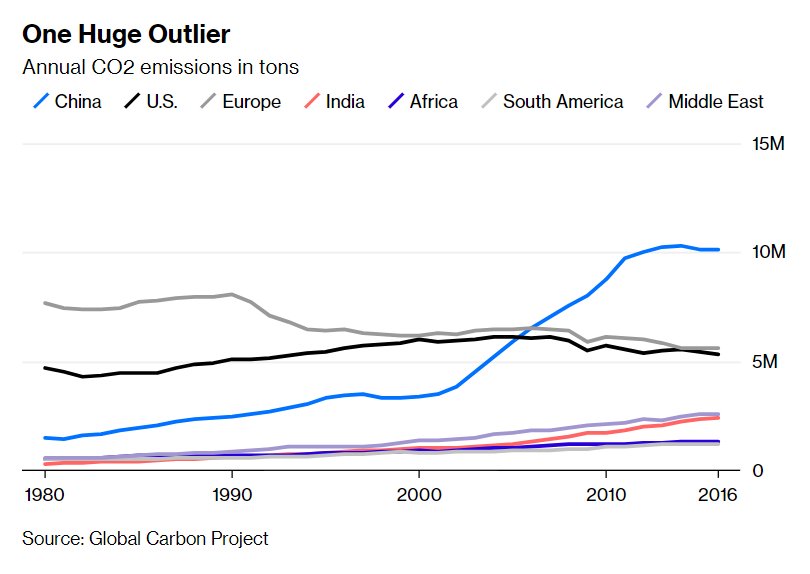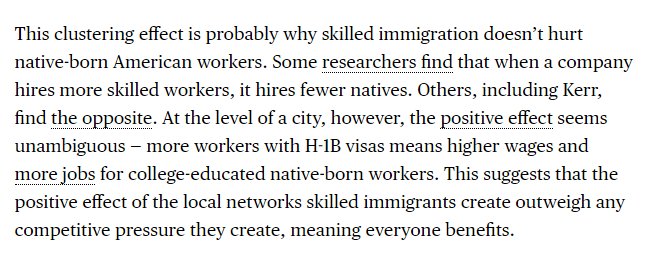Authors Noah Smith
One thing I've been noticing about responses to today's column is that many people still don't get how strong the forces behind regional divergence are, and how hard to reverse 1/ https://t.co/Ft2aH1NcQt
— Paul Krugman (@paulkrugman) November 20, 2018
See this thing that @lymanstoneky wrote:
And see this thing that I wrote:
And see this book that @JamesFallows wrote:
And see this other thing that I wrote:
To me, the most important aspect of the 2018 midterms wasn't even about partisan control, but about democracy and voting rights. That's the real battle.
2/The good news: It's now an issue that everyone's talking about, and that everyone cares about.
3/More good news: Florida's proposition to give felons voting rights won. But it didn't just win - it won with substantial support from Republican voters.
That suggests there is still SOME grassroots support for democracy that transcends
4/Yet more good news: Michigan made it easier to vote. Again, by plebiscite, showing broad support for voting rights as an
5/OK, now the bad news.
We seem to have accepted electoral dysfunction in Florida as a permanent thing. The 2000 election has never really
Bad ballot design led to a lot of undervotes for Bill Nelson in Broward Co., possibly even enough to cost him his Senate seat. They do appear to be real undervotes, though, instead of tabulation errors. He doesn't really seem to have a path to victory. https://t.co/utUhY2KTaR
— Nate Silver (@NateSilver538) November 16, 2018
This New York Times feature shows China with a Gini Index of less than 30, which would make it more equal than Canada, France, or the Netherlands. https://t.co/g3Sv6DZTDE
That's weird. Income inequality in China is legendary.
Let's check this number.
2/The New York Times cites the World Bank's recent report, "Fair Progress? Economic Mobility across Generations Around the World".
The report is available here:
3/The World Bank report has a graph in which it appears to show the same value for China's Gini - under 0.3.
The graph cites the World Development Indicators as its source for the income inequality data.
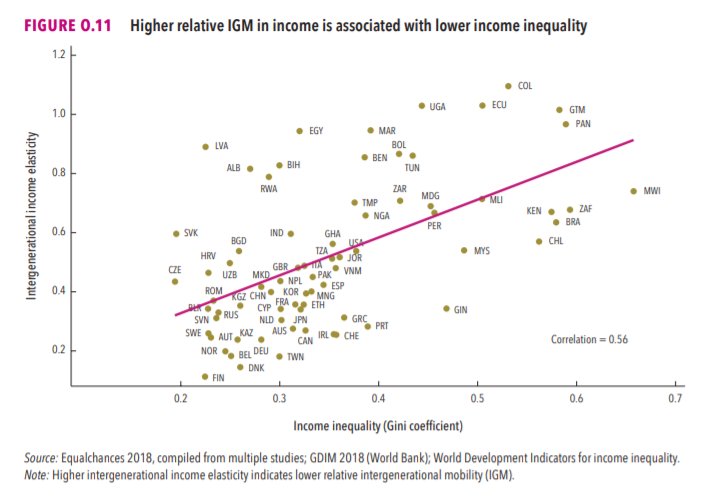
4/The World Development Indicators are available at the World Bank's website.
Here's the Gini index: https://t.co/MvylQzpX6A
It looks as if the latest estimate for China's Gini is 42.2.
That estimate is from 2012.
5/A Gini of 42.2 would put China in the same neighborhood as the U.S., whose Gini was estimated at 41 in 2013.
I can't find the <30 number anywhere. The only other estimate in the tables for China is from 2008, when it was estimated at 42.8.
It looks like decolonization just took a few decades to start
Basic econ theory says poor countries should grow faster than rich ones.
But for much of the Industrial Revolution, the opposite happened.
https://t.co/JjjVtWzz5c
Why? Probably because the first countries to discover industrial technologies used them to conquer the others!
But then colonial empires went away. And yet still, for the next 30 years or so, poor countries fell further behind rich ones.
https://t.co/hilDvv0IQV
Why??
Possible reasons:
1. Bad institutions (dictators, communism, autarkic trade regimes)
2. Civil wars
3. Lack of education
But then, starting in the 80s (for China) and the 90s (for India and Indonesia), some of the biggest poor countries got their acts together and started to catch up!
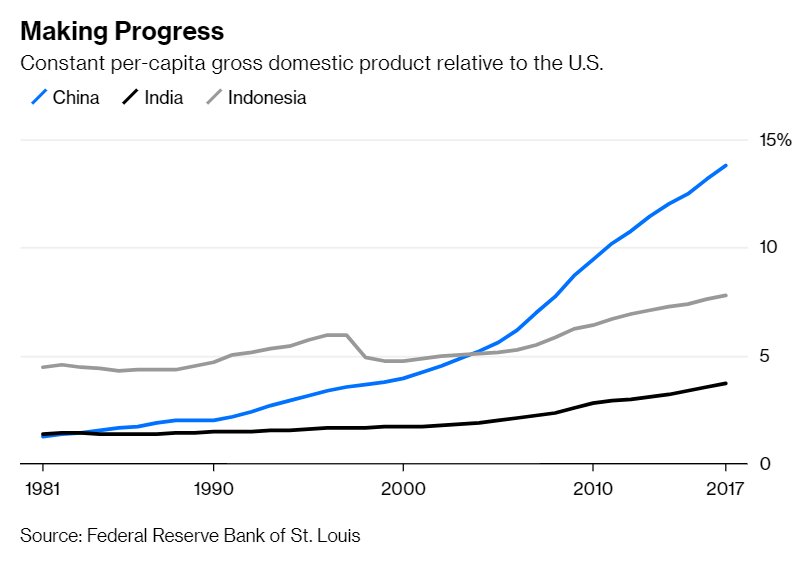
Global inequality began to fall.
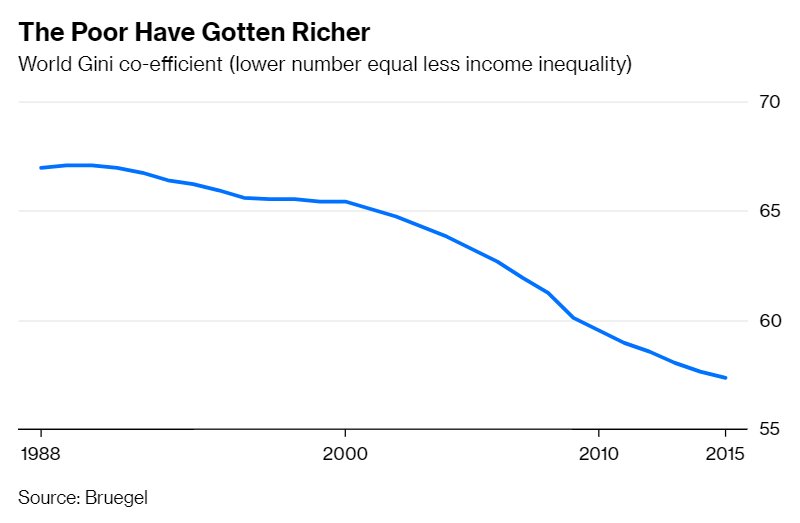
This explains why immigration is now at the center of partisan conflict.
Why did California turn Blue?
— Sen. Eric Brakey (@SenatorBrakey) October 28, 2018
Why is Texas turning Blue?
The left has failed at selling socialism to the American people for decades. We have rejected it.
Their new strategy is mass importation of new voters to transform our political culture.
Of course, the belief in ethnic bloc voting becomes a self-fulfilling prophecy.
When a slight Dem tilt among Hispanics and Asians caused the GOP to turn against them, Hispanics and Asians shifted more toward the Dems. Etc. etc. A self-reinforcing cycle.
Bush's 2006 amnesty attempt, and the 2013 intra-GOP fight over immigration reform, were two moments when the GOP could have turned back to the approach of Reagan, and courted Hispanics and Asians.
But they decided against this, and...here we are.
What will disrupt this bad equilibrium, and save American politics from being an eternal race war?
Either:
A) More white voters will grow disgusted with the GOP approach and defect, or
B) The GOP will find some non-immigration-related issues to attract more Hispanics and Asians.
As long as both parties see elections in terms of racial bloc voting - where the only way to win is to increase turnout among your own racial blocs or suppress turnout by the other party's racial blocs - American politics will not improve, and the country will decline.
(end)
\u2018The Simpsons\u2019 producer confirms Apu is being written out of show following controversy https://t.co/lKzFCe1wFa pic.twitter.com/s34IUDUtqs
— NME (@NME) October 26, 2018
2/Apu's presence in Springfield represented a basic reality of America in the late 20th and early 21st century: the presence of nonwhite immigrants.
3/As Tomas Jimenez writes in "The Other Side of Assimilation", for my generation, immigrants from India, China, Mexico, and many other countries aren't strange or foreign. On the contrary, they're a
4/But that America I grew up with is fundamentally ephemeral. The kids of immigrants don't retain their parents' culture. They merge into the local culture (and, as Jimenez documents, the local culture changes to reflect their influence).
5/Simpsons character don't change. But real people, and real communities, do. So a character who once represented the diversity that immigrants brought to American towns now represents a stereotype of Indian-Americans as "permanent foreigners".
Secretary of State Mike Pompeo said the U.S. is quickly approaching \u201ca moment of crisis\u201d because of the \u201crecord number of migrants\u201d spilling into the country https://t.co/QuiWPcXswA
— POLITICO (@politico) October 20, 2018
Facts.
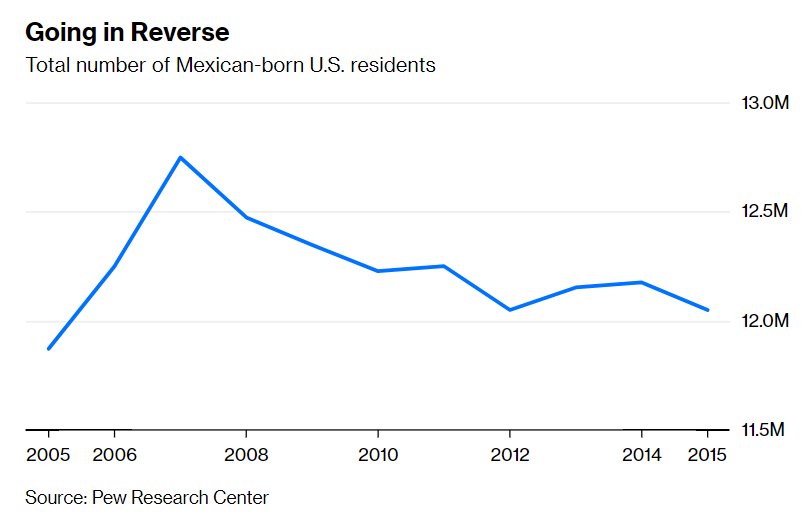
Facts!!
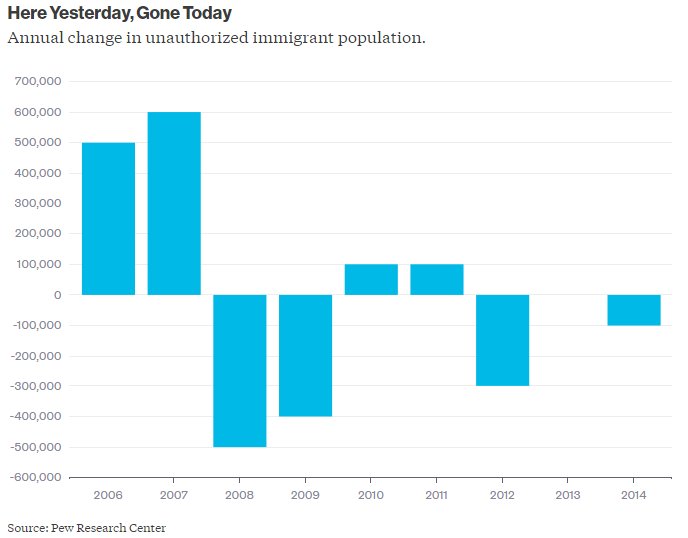
FACTS FACTS
Moar
At one point there were five bombings in America *every day*. https://t.co/VUnLr2IDyt
— Noah Smith (@Noahpinion) October 7, 2018
Deadly riots in literally hundreds of American cities. A rash of high-profile political assassinations. Soldiers shooting protesters on college campuses!
Labor disputes used to kill hundreds of people!
In 1932 Douglas MacArthur called in tanks on protesting veterans, injuring over a thousand people!
In 1967 there were 159 race riots in cities across
In 1921, rioters used airplanes to bomb black businesses in Tulsa, Oklahoma! Hundreds were killed in the riot!
I will be live-tweeting again, and you can also watch video at either the Twitter or Facebook links below!
Bloomberg Ideas conference now starting! I will be live-tweeting it. You can watch on our Facebook or Twitter pages (links below)! https://t.co/Mbr9dZzWBy
— Noah Smith (@Noahpinion) October 25, 2018
Kaissar: Every industry gets regulated when it gets big. The question is what kind of regulation Big Tech will get,and whether the companies will be proactive in shaping it.
Kaissar: More profitable companies have higher returns. Why? Maybe it's a risk factor, because more profit = higher risk of getting regulated.
Bershidskyis showing a diagram of GDPR complaince pop-ups. What a massive ill-conceived bureaucratic mess.
Ritholtz: It's 2018 and we're still talking about Facebook privacy settings?! If you're still giving your personal data to Facebook, you just don't care about privacy!
Today and tomorrow we'll be having a Bloomberg Ideas event!
— Noah Smith (@Noahpinion) October 25, 2018
Today will be a panel on cryptocurrency.
Tomorrow will be panels on the economics of AI, and on regulation of big tech companies.
You can watch livestreams here:https://t.co/1dC0ELGvabhttps://t.co/Juz5Mp2EC1 pic.twitter.com/VfxOscNflo
Our first panel is about cryptocurrency! We have @matt_levine, @tylercowen, @eiaine, @nirkaissar, and Camilla
Ou: Crypto will be useful for the unbanked.
Cowen: Crypto has to compete against a bunch of other emerging payments technologies. Bitcoin is too inflexible.
Cowen: I'll bet on the payments companies over crypto.

